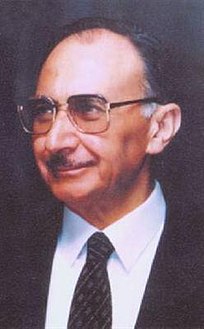Thoukan Al-Hindawy
About him
Thouqan Al-Hindawi is a Jordanian politician, educator and parliamentarian, born in 1927 in the house of his father, Salem Pasha Al-Hindawi, located in the Al-Hindawi clan lodge in the north of the Hashemite Kingdom of Jordan, or what was known as the Emirate of Transjordan. During a period of 40 years of his working life, Al-Hindawi held many high official and governmental positions from 1965 to 2005, the most important of which were Chief of the Royal Hashemite Court, Deputy Prime Minister, Minister of Education, Minister of Information, Minister of Finance, Minister of Social Affairs, Minister of Labor , Minister of State for Cabinet Affairs, appointed, deputy, ambassador extraordinary. He died, may God have mercy on him, on July 2, 2005, after a life full of activity and giving, as a result of a severe heart attack. He was buried in the tombs of the Royal Hashemite Court near the tomb of the late King Hussein bin Talal.
Scientific background
Al-Hindawi received his primary education for the first three grades at Al-Naima Primary School, and then moved to Irbid School, where he studied until the eighth grade. Then, due to his scientific excellence, he was sent to continue his studies at the Arab College in the Arab city of Jerusalem, where he completed secondary school and obtained the Palestinian Mutrah Certificate and then the English General Certificate of Secondary Education from a school affiliated with the University of London in 1946. After that, Al-Hindawi continued his university studies at Fouad I University or the University of Fouad I. Currently, he received his BA in History in 1950, and after several years of work in the educational field, he obtained a Master’s in Education from the University of Maryland in the United States of America in 1956.
professional background
Al-Hindawi began his career in 1951 as a history teacher at the Ministry of Education in the Hashemite Kingdom of Jordan, where he was sent to Karak Secondary School and then transferred to Irbid Secondary School. He was promoted shortly afterwards to become an educational inspector at the Ministry’s headquarters in the capital, Amman, and then director of a teacher’s home in Beit Hanina in the West Bank, as soon as he obtained a master’s degree in education in 1956. After that, he moved to work at UNRWA, where he took the position of Director of the Social Affairs Department in 1961. Then, after several years, he returned to work in the Jordanian government as a cultural attaché at its embassy in Cairo in 1964, but he did not last long in that position, as he was appointed as Under-Secretary-General of the Ministry of Information in the same year.
official positions
Al-Hindawi held his first ministerial position as Minister of Information in the third formation of Prime Minister Wasfi Al-Tal on February 13, 1965. Then, during a period of 40 years, Al-Hindawi held several important ministerial positions almost continuously from that date to 1995, the most important of which was Deputy Prime Minister Minister of Education, Minister of Information, Minister of Finance, Minister of Social Affairs, Minister of Labor, Minister of State for Cabinet Affairs.
Al-Hindawi held the position of Minister of Education more times and for a longer period of time than any of the other ministers held for this vital ministry. Educators and historians, based on documented facts, consider that Al-Hindawi deserved the title and fame of an engineer and leader of the educational revolution that Jordan witnessed from the mid-sixties of the last century, and he is also a major contributor to the educational renaissance of the entire Arab world.
Al-Hindawi was chosen by King Hussein bin Talal for the post of Chief of the Royal Hashemite Court in 1989, as well as Ambassador Extraordinary and Abroad twice. The King also chose him as the appointed and first vice-president of the Jordanian Senate 4 times, and he became an effective head of a number of the council’s strategic committees, including the Foreign Affairs Committee and the Educational, Educational and Cultural Affairs Committee. Al-Hindawi also won the position of People’s Representative in the 11th House of Representatives elections for a 4-year term.
Al-Hindawi was a continuous member of a large number of boards of trustees of public and private universities, including the University of Jordan and Yarmouk University, and the Chairman of the Board of Trustees of a number of others, including the University of Applied Sciences and the Arab Community College, in addition to his membership in the Jordanian Arabic Language Academy, the Arab Orphan Care Committee, and others.
Thinker and writer
Al-Hindawi is considered the owner of a pure school of thought in nationalism and patriotism, as well as the owner of a distinguished school of education. He believed that the Palestinian cause was the central issue of the nation, and the title of “Professor” was his favorite title. Among his most prominent books is the book The Palestinian Question, which was taught in the third grade of secondary school in Jordan from 1967 to 1996.
Death and eulogy
Al-Hindawi died on the morning of July 2, 2005 as a result of a severe heart attack and was buried in the tombs of the Royal Hashemite Court near the tomb of King Hussein bin Talal. A large number of statesmen, former prime ministers and officials recalled at his memorial service on August 22, 2005.

